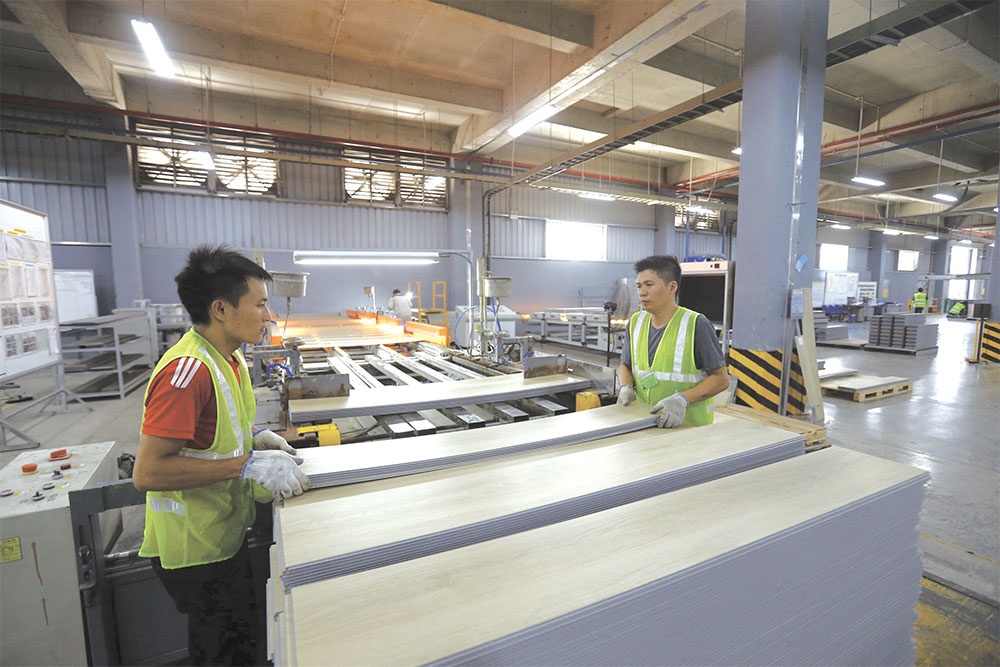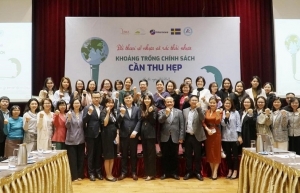Flooring producers tackle shifts within global market
 |
| SPC flooring is an evolution of conventional vinyl flooring, more stable and durable than wood |
Stone plastic composite (SPC) flooring orders for the US market should rebound in the last months of this year. However, Le Quang, CEO of Neo Floor, one of the five largest SPC flooring manufacturers in Vietnam, is not so upbeat.
Quang’s market analysis team, which has closely followed the US market to evaluate new developments and competitiveness, has noted that it will be tough for the company to compete with Chinese equivalents.
In the early September meeting at the company’s headquarters in Hanoi, a member of the analysis team said, “As well as China, the company is struggling to vie for market share with counterparts from Thailand, Cambodia, and India. These nations not only boast advantages of scale and competitive prices but also enjoy a zero tariff rate in the US market.”
Despite the slowdown of the US economy post-pandemic, the demand for SPC flooring has levelled off thanks to the good absorption rate of residential and commercial building projects. This has saved SPC flooring manufacturers and traders from recession, according to Quang.
“Neo has made efforts to adjust its business strategy and access and negotiate new orders with major distributors like Calibamboo, Mohawk, and Anatolie,” Quang said.
“The company has also formed a partnership with MS International, Inc., which is one of the US’ leading material distributors,” he added.
Neo’s SPC products, made of tiling material made from PE plastic, calcium carbonate (CaCO3) stone powder, and anti-expansion additives, have also been available at many large supermarket chains in the US such as Home Depot since the start of 2021.
The company has also updated its plan to increase profit margins for the last quarter of 2023. The update is based on the completion of the distribution system and the scale of output meeting the requirements of large buyers, such as Discount Hardwood Floors, Old Master, Town and Country Ceramic Tiles, Tucsun, and CA Flooring.
At its AGM earlier this year, Neo announced that domestic consumption only accounted for 10 per cent, with the remaining products being exported. The company has also purchased the copyright for key technology from an American partner.
Neo boasts two advantages to create a competitive edge for the company. Firstly, 75 per cent of the materials for SPC flooring are CaCO3. Neo owns a CaCO3 quarry in the central province of Nghe An, with reserves of more than five million cu.m. Thanks to the raw material area, the company can ensure the quality and origin of its products exported to the US.
Secondly, the company has made heavy investments in research and development. After two years of investing in such activities, Neo’s scientists have come up with a formula for mixing additives, thereby completing the entire SPC floor production line.
However, there are grounds for the company’s concerns. American consumers used to benefit from China’s low-cost construction materials. Analysts pointed out that despite the US’ lingering tariffs on Chinese imports over the years, China remains the largest goods supplier to the US.
Trade in goods between the US and China rose to a record high in 2022 and US imports of goods from China totalled $538.8 billion, slightly less than the record import level in 2018.
The increasing domestic costs, coupled with the nearly five-year trade dispute with the US and rounds of sanctions, have shaken China’s position in the global value chain.
Exports are an important driving force for China. However, customs data showed that its exports fell by 8.8 per cent in August on-year. China’s shipments to Western countries also decreased significantly in August compared to the same period last year. Specifically, goods to the US decreased by 17.4 per cent, while imports contracted by 7.3 per cent in August from a year ago.
US goods imports from China totalled $203 billion during the first six months of 2023, down by one-quarter against last year’s period, according to the US Commerce Department.
According to some SPC manufacturers in Vietnam, the recent recovery of the American construction market signifies a potential growth of SPC flooring imports from Vietnam to the US. However, the opportunities for Vietnamese SPC manufacturers will be snapped up by Chinese counterparts, which are extending their reach to international markets.
The S&P Homebuilders Select Industry stock index is up 40 per cent this year as of mid-July, outpacing the S&P 500’s 18.6 per cent gain. Share prices for D.R. Horton, Lennar, and PulteGroup, the three largest home builders, have performed even better.
Nguyen Quang Cung, vice chairman of the Vietnam Association for Building Materials, said that in August, China’s exports to the US fell 17.4 per cent from a year earlier to $45.03 billion.
“Meanwhile, Chinese policymakers are focusing on domestic economic challenges, especially the real estate market, which directly impacts the construction materials industry. Therefore, many Chinese construction material manufacturers are facing a shortage of markets,” Cung said.
“Chinese manufacturers are paying more attention to cash flow for business and production. Many Chinese businesses have introduced their products and sought investment opportunities at recent industrial exhibitions in Vietnam,” he added.
| In 2021, the total value of SPC exports from Vietnam to the US reached $784 million, accounting for 14 per cent of consumption value in the US. Export output reached 84 million sq.m or 19.2 per cent of consumption in the US. In 2022, the total value of SPC exports from Vietnam to the US reached $939 million, accounting for 17 per cent of consumption value in the US. Export output reached 125 million sq.m or 28.7 per cent of consumption in the US. |
| Le Quang - CEO, Neo Floor
As of present, the US economy is in recovery. It needs more time for business, production, and trade activities to stabilise in the United States. Luxury vinyl tiles (LVT) and SPC flooring led the US resilient flooring market, with a compound annual growth rate of 30 per cent during the 2019-2021 period. Meanwhile, both the LVT and SPC flooring held a 21.5 per cent market share in 2021, equivalent to $7.25 billion. The trend of LVT and SPC continues to gain traction in many countries around the world. In terms of products, there is no difference in the quality of locally made and foreign-made products. For instance, SPC flooring by Neo Floor has gone through a strict quality testing process before exporting to the US and EU markets. Neo Floor’s QC laboratory is fully equipped with tests according to ASTM/EN standards, such as surface durability, abrasion resistance, scratch resistance, impact resistance, expansion and dimensional stability, lock durability, and surface gloss. In addition, flooring manufacturers need to meet international standards and certificates such as the SGS certificate, the CE certificate, and the GreenGuard certificate for product quality or floor core standards for products to ensure absolute safety. For health, the company follows an ISO quality management system according to international standards. However, because Vietnamese SPC manufacturers are export-oriented, they are subject to huge risks amidst global geopolitical and economic fluctuations, including the US market. Vietnamese SPC manufacturers are facing a huge problem given that the US government issued the UFLPA Act, tightening restrictions on the importation into the US of goods originating in Xinjiang. As a result, a slew of major buyers have withdrawn from China. With the output pressure, many Chinese manufacturers have been investing in neighbouring countries, including Vietnam. At this time, concerns about origin fraud are emerging. There are 26 large SPC flooring factories in Vietnam, including 12 Chinese manufacturers. Many enterprises in the top 10 largest Chinese manufacturers are present in Vietnam, including Jufeng, Jinka, Huali, BBL, Zhongtai, Risesun, Vinh Du, and Haixin. Meanwhile, Vietnamese manufacturers are smaller in scale than Chinese manufacturers. Intensifying competition forces Vietnamese SPC flooring manufacturers must quickly adapt to the market, complete the supply chain, and ensure transparency of the origin of raw materials. |
 | Plastic use drop hinges on consumers High investments in more environmentally-friendly recycling and alternative solutions for plastics and the existing habit of using single-use plastics are challenges that hinder businesses from developing circular economy solutions and promoting sustainable growth. |
 | Closing policy gaps for plastics and plastic waste More than 60 delegates from environmental authorities, media agencies, businesses, environmental networks, and social organisations have participated in the Dialogue on plastic and plastic waste – Closing the policy gaps event organised by the For Vietnamese Stature Foundation (VSF) on February 28 in Hanoi. |
 | Unilever and Central Retail team up on plastic waste A ceremony on August 23 to launch a cooperative agreement between Unilever Vietnam and Central Retail Vietnam on plastic waste segregation is indicative of their joint commitment to alleviate the current burden on the environment and bring the ideals of the circular economy to fruition. |
What the stars mean:
★ Poor ★ ★ Promising ★★★ Good ★★★★ Very good ★★★★★ Exceptional
Related Contents
Latest News
More News
- State corporations poised to drive 2026 growth (February 03, 2026 | 13:58)
- Why high-tech talent will define Vietnam’s growth (February 02, 2026 | 10:47)
- FMCG resilience amid varying storms (February 02, 2026 | 10:00)
- Customs reforms strengthen business confidence, support trade growth (February 01, 2026 | 08:20)
- Vietnam and US to launch sixth trade negotiation round (January 30, 2026 | 15:19)
- Digital publishing emerges as key growth driver in Vietnam (January 30, 2026 | 10:59)
- EVN signs key contract for Tri An hydropower expansion (January 30, 2026 | 10:57)
- Vietnam to lead trade growth in ASEAN (January 29, 2026 | 15:08)
- Carlsberg Vietnam delivers Lunar New Year support in central region (January 28, 2026 | 17:19)
- TikTok penalised $35,000 in Vietnam for consumer protection violations (January 28, 2026 | 17:15)


 Tag:
Tag:















 Mobile Version
Mobile Version